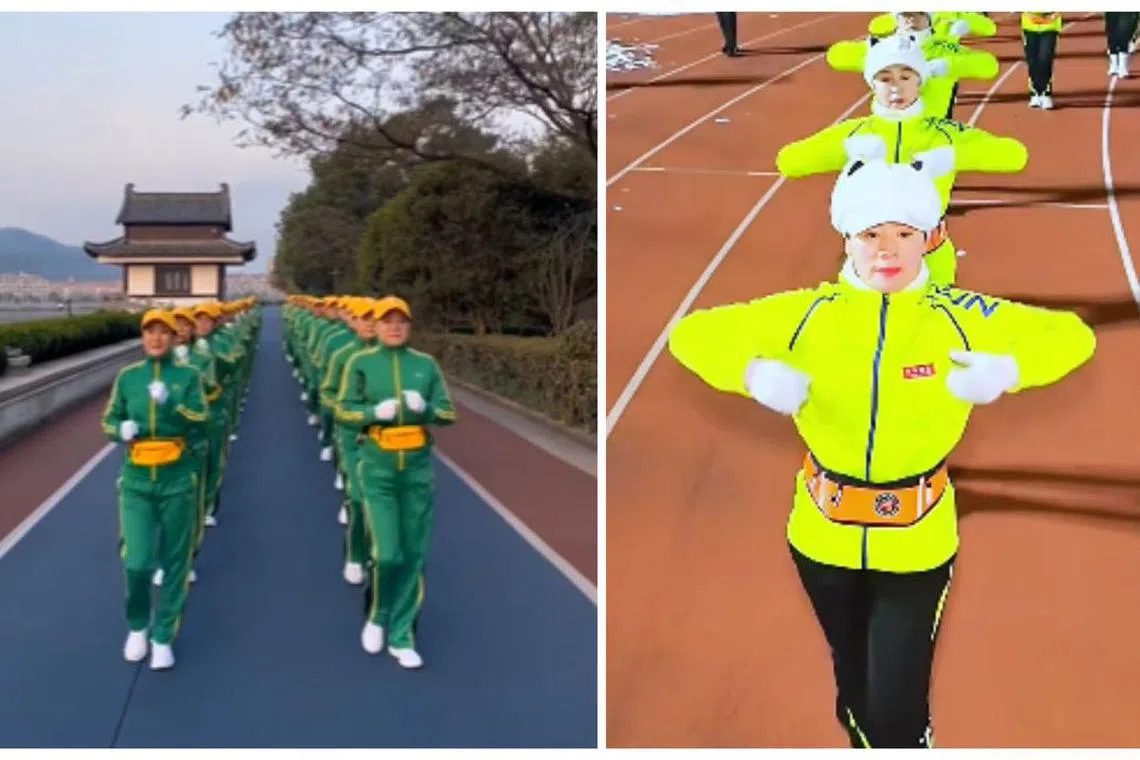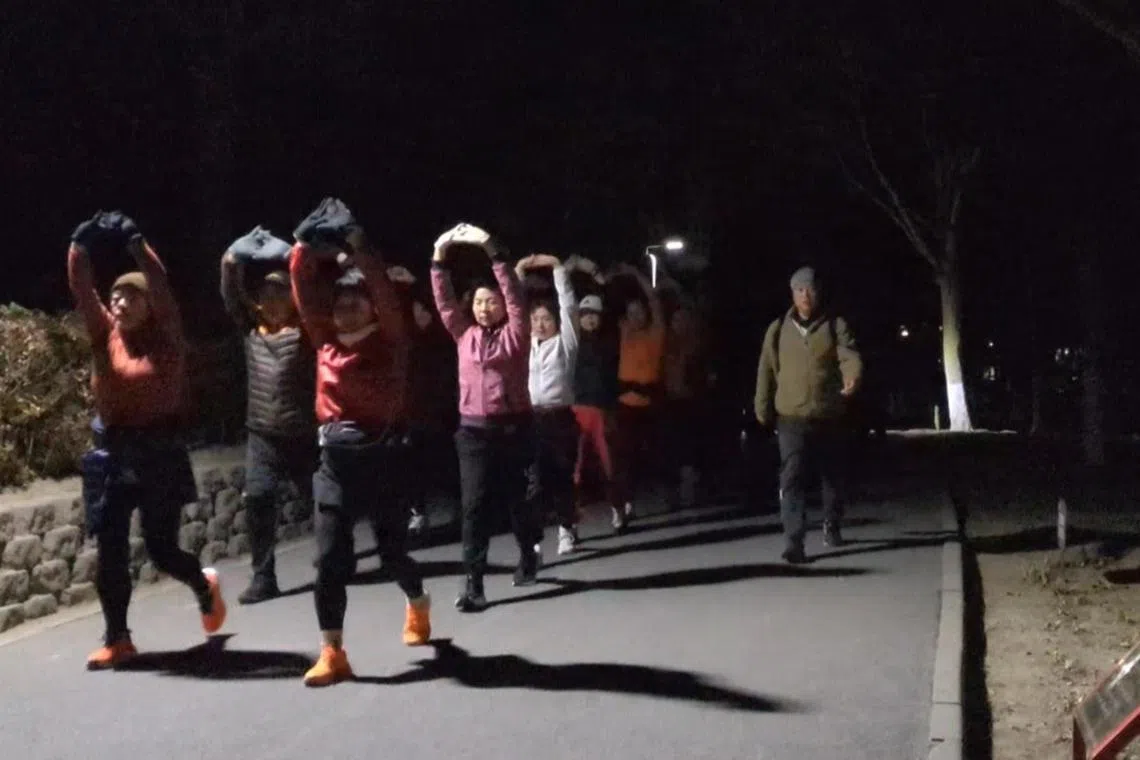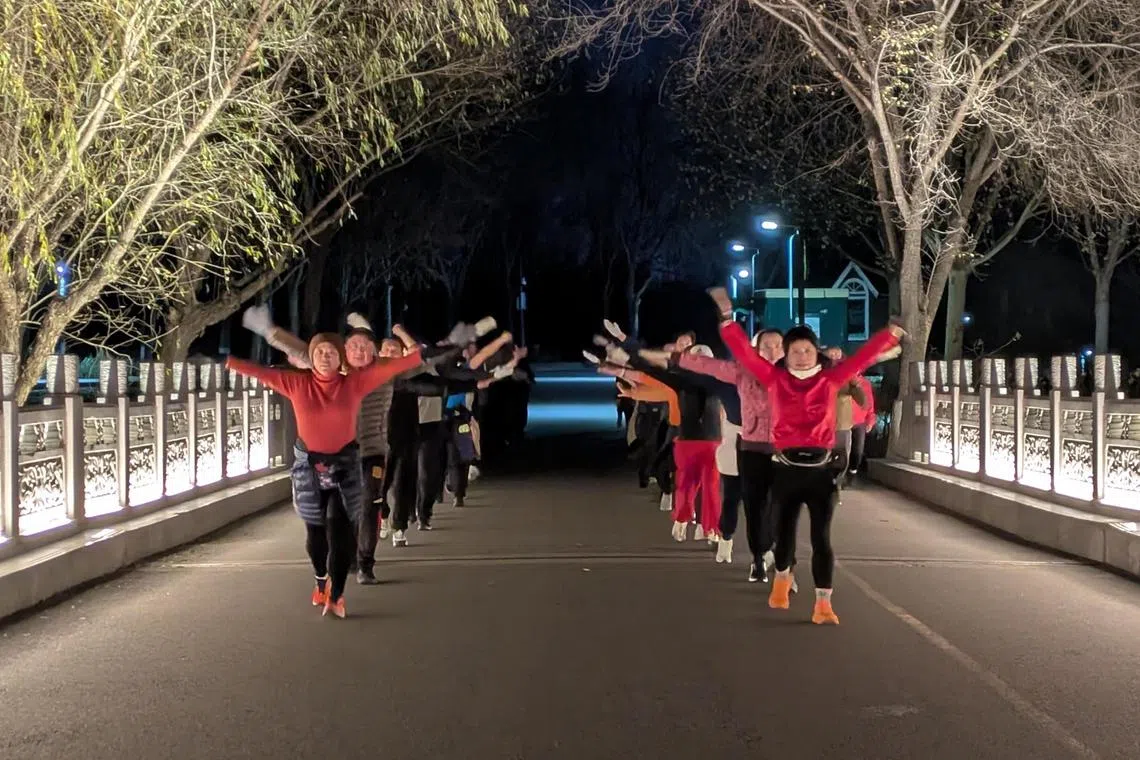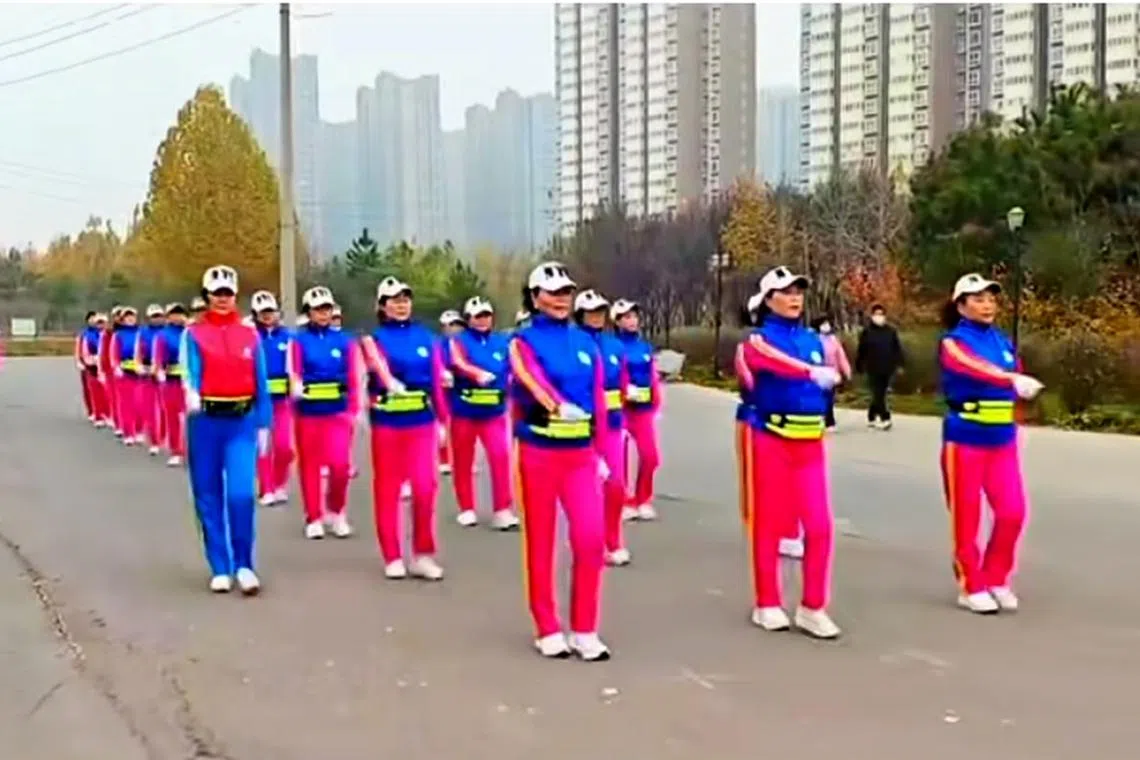‘Explosive walking groups’ march on in China despite Zhuhai car attack
Sign up now: Get insights on Asia's fast-moving developments

A brisk walking group exercising on Dec 5 in Zhengzhou city, the capital of Henan province.
PHOTO: SHIPINHAO/YINGYULAOSHI9168
BEIJING – They march in unison to the beat of blaring Chinese music, chanting “one, two, three, four” while garbed in the same bright-coloured custom-made uniform.
Nicknamed “explosive walking groups”, these brisk walkers – who can number in their hundreds – take to their exercise of choice with military regimentation, often with their own flag and sign bearers, and even a videographer.
On short video apps like Kuaishou and WeChat, dozens of communities across China share clips of them moving in synchrony – a group activity that appears to have already gained traction by the late-2000s.
When a man drove a sport utility vehicle into a crowd at a sports hall in Zhuhai on the evening of Nov 11,
Videos of the carnage show members from at least three such groups sprawled on the ground, surrounded by fallen flags, stray shoes and the cries of their companions.
Online, some netizens have quickly used the Zhuhai attack to highlight how these groups have rankled Chinese society in recent years by obstructing traffic and creating noise – criticisms echoed by local media.
But neither fear nor criticism can deter these brisk walkers.
Mr Xu Yue, 60, who joined a brisk walking group in Beijing in November 2023, said there was no need to worry about safety as the recent spate of violence, which included a stabbing rampage on Nov 16 in Jiangsu province, comprised “isolated incidents”.
“The attacks are not common phenomena,” said the retired businessman.

These brisk-walkers take to their exercise of choice with military regimentation.
PHOTOS: SHIPINHAO/1231088, SHIPINHAO/XIAOCAIJUNMAJJANZOU
He added that the group chose to exercise at Nanhaizi Park, a former royal hunting ground and imperial park on the outskirts of Beijing, partly because they do not wish to affect other people and obstruct traffic on the road.
Every evening, they tackle an undulating 4km-route around the lake twice.
Braving the freezing darkness on a recent weekday evening, Mr Xu led the group’s cheers as they marched and waved their limbs in two orderly rows of roughly 30 people.
He said: “I admire soldiers, so this will usually influence the cheers. Military rhythms are very suitable for exercising.”

A brisk walking group in Beijing’s Nanhaizi Park in Daxing district on Dec 2.
ST PHOTO: ANG QING
Salesman Li Jiale, 42, who was drawn to the team while jogging in the park, said: “I felt that they were so full of positive energy. There were so many people that I didn’t feel lonely.”
The walkers are from all age groups and walks of life and include de-mobilised soldiers, a security officer and a seven-year-old pupil following her mother.
At the end of each session, members share the group’s timings and a video of the night’s walk on WeChat.
These videos are the group’s way of “da ka”, which literally means “punching the card”, referencing a trend of marking where one has been by posting it on social media, according to Mr Xu.
He said: “These videos give us enjoyment. They bring a sense of achievement and tell my friends how healthy I am.”
Mr Li said more than 80 members have lost weight in 2024 from the team activity.
He added: “The results of the team show that being healthy does not require complex equipment or high costs. It just needs a heart that wants to be healthy and unwavering conviction.”
The large numbers coming together to walk, however, have become flashpoints across China’s cities, especially when they venture onto the roads.
In eastern Shandong province, a taxi crashed into one such group walking on a road in 2017, killing one and injuring two, triggering heated debate as to which party should be responsible for the accident.
More recently in 2023, a group crossing a road in north-eastern Liaoning province was labelled as “immoral” for obstructing a man rushing home to see a sick, elderly family member.
Some like Mr Yi Jiandong, a regular marathon participant, are opposed to brisk walking.
“Not only does it obstruct traffic and the public, from a scientific perspective, brisk walking is not as good as jogging slowly and running marathons,” said the 55-year-old sports researcher.
He thinks the activity is popular because people fear running, and the costs of walking are low.

A brisk walking group in Beijing’s Nanhaizi Park in Daxing district on Dec 2.
ST PHOTO: ANG QING
Anthropologist Judith Farquhar, who researches traditional medicine and everyday life in contemporary China, said that while these groups are striving for fitness, their collective occupation of public spaces is also performative.
“They might be saying that I’m only doing this so my body will look better, but I think these brisk walkers are doing it because they like how it makes them feel,” said Professor Farquhar, who teaches at the University of Chicago.
“It can’t be denied that it seems to be making them feel more militaristic, more aggressive.”
Such brisk walking groups already existed in 2009, and had frustrated park users even then, said Prof Farquhar, who was studying Beijing’s public parks at the time.
In China, common spaces like parks are important for those living in small apartments in the city, she added.

A brisk walking group in Henan province on Dec 4.
PHOTO: SHIPINHAO/JINGSHUN
Parks, in particular, are social spaces where locals join choral singing and folk dancing groups, practise callisthenics, or just meet their friends, she wrote in her study.
Over the years, the authorities in various cities have regulated other organised activities in public spaces like square dancing or plaza dancing, to curb excessive noise and disturbance.
Going forward, Mr Xu, who used to exercise near the city centre of Beijing, said steps can be taken to ensure that brisk walking groups do not annoy others.
He said: “I don’t think it’s an issue to have a lot of people, or to exercise in city parks. You can always avoid peak periods, or lower the volume of your music, or have everyone wear headsets.”



